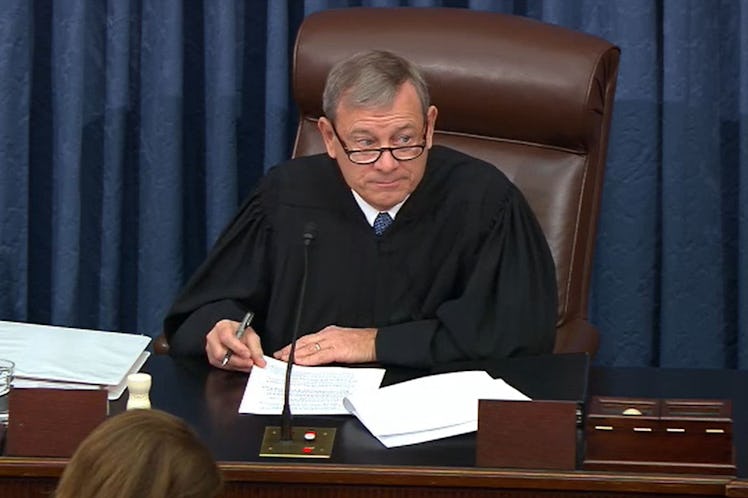
Don't Count On This Action From The Chief Justice On Impeachment
President Donald Trump's impeachment trial kicked off in the Senate on Tuesday, Jan. 21 — and right from the beginning, the Senate's trial rules were the subject of fierce debate. We know for a fact that the Senate must decide whether to convict or acquit Trump on two articles of impeachment, but given that the chief justice of the Supreme Court oversees the trial, can the chief justice dismiss these articles of impeachment? Trump's personal lawyer, Rudy Giuliani, seems to think so, but the chief justice's power is limited.
With the Senate impeachment trial underway, there's already been chatter about whether the articles of impeachment can be dismissed. The president has referred to the impeachment proceedings as a "hoax," and on Jan. 18 Trump's legal team referred to the articles against him as "brazen" and "unlawful" in a memo. However, the Constitution does explicitly allocate specific responsibilities to the House of Representatives, the Senate, and the chief justice. The House has the authority to impeach a president, but only the Senate has the power to organize an impeachment trial and remove a president from office. The chief justice's responsibility, meanwhile, is to preside over the Senate impeachment trial and ensure that senators are exercising their oath "to do impartial justice."
According to the Senate's current rules, Roberts will have the power to issue “orders, mandates, writs, and precepts,” to “direct all the forms of proceedings while the Senate is sitting for the purpose of trying and impeachment,” and to “rule on all questions of evidence including, but not limited to, questions of relevancy, materiality, and redundancy of evidence.” However, the Senate has the final say on whether or not to acquit Trump, which means that Roberts does not have the authority to dismiss the articles of impeachment.
In a Jan. 8 interview with Fox News, Giuliani appeared to argue that the Supreme Court should dismiss the articles of impeachment against Trump, on the grounds that the charges — abuse of power and obstruction of Congress — are allegedly made up attempts to accuse Trump of "not looking nice."
“The remedy is to go before the Supreme Court of the United States and have it declared unconstitutional," Giuliani argued, per The Daily Beast. “The rules are set by the Senate. Then the chief justice interprets the rules. The chief justice will be given the power to dismiss."
But previous writings from both Roberts and former Chief Justice William H. Rehnquist seem to counter Giuliani's argument. Both chief justices made it clear that even if they did have the authority to make key decisions in impeachment cases, which they don't, the justices don't view their roles in impeachment as central to the proceedings. Rehnquist argued in a 1993 court opinion that “the judiciary, and the Supreme Court in particular, were not chosen to have any role in impeachments." What's more, Roberts himself seems to view the role as more limited. He told the Senate Judiciary Committee in 2005 that "the role of an umpire and a judge is critical."
"They make sure everybody plays by the rules," Roberts said at the time. "But it is a limited role. Nobody ever went to a ballgame to see the umpire."
Roberts has made it clear that he fully intends to be a neutral umpire (metaphorically) in Trump's impeachment, and the beginning of Trump's trial on Jan. 21 was a perfect example of that intention. As Democrats and Republicans engaged in a heated debate over the Senate's trial rules, Roberts chided both parties and urged them to take a step back.
“I think it is appropriate at this point for me to admonish both the House managers and the president’s counsel in equal terms to remember that they are addressing the world’s greatest deliberative body,” Roberts said.
Although Roberts may not have the power to dismiss the impeachment charges against Trump, he does have the authority to hold senators accountable for organizing a just trial — and he clearly plans to stick to that role as the trial continues.